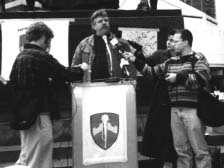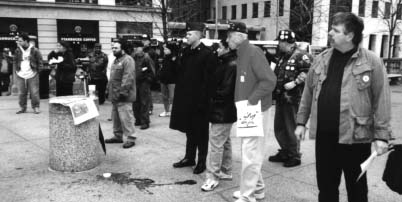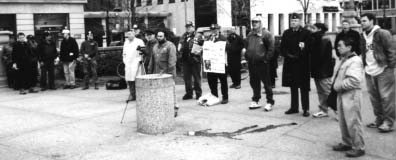 Download PDF of this full issue: v29n2.pdf (11.4 MB)
Download PDF of this full issue: v29n2.pdf (11.4 MB)From Vietnam Veterans Against the War, http://www.vvaw.org/veteran/article/?id=154
 Download PDF of this full issue: v29n2.pdf (11.4 MB) Download PDF of this full issue: v29n2.pdf (11.4 MB) |
11-11-11. Once again we gathered to remind everyone of the true costs of war. The weather was milder than usual, though the late fall version of the "Hawk" was whipping around pretty well on the corner of Wacker and Wabash.
There seemed to be more media representatives than attendees, but soon more VVAW members and friends, as well as other onlookers (including one active duty Army sergeant) showed up, and we began what seemed to be the only Veterans Day ceremony taking place in the city of Chicago that day. For the second year in a row, the Mayor's Office was sending every call in our direction, and the National Office received some 25 calls from media and other interested folks in the days leading up to this event.
 Bill Davis, former national coordinator of VVAW and Air Force veteran, opened the event as master of ceremonies by reminding everyone what VVAW continues to do after more than thirty years of struggles. We fight to make good on the promises that successive U.S. administrations have made to successive generations of U.S. veterans. We won't allow the government to fight wars "on the cheap" by ignoring the health and other needs of veterans. Bill announced that this day's event was dedicated to the memory of Sergeant First Class Edward Carter, who was awarded the Medal of Honor posthumously in 1997 for extraordinary heroism during World War II. Carter, who fought in the Spanish Civil War with the Abraham Lincoln Brigade, was secretly investigated as a suspected communist and denied re-enlistment in 1949 during the postwar red scare. (See story on page 8.)
Bill Davis, former national coordinator of VVAW and Air Force veteran, opened the event as master of ceremonies by reminding everyone what VVAW continues to do after more than thirty years of struggles. We fight to make good on the promises that successive U.S. administrations have made to successive generations of U.S. veterans. We won't allow the government to fight wars "on the cheap" by ignoring the health and other needs of veterans. Bill announced that this day's event was dedicated to the memory of Sergeant First Class Edward Carter, who was awarded the Medal of Honor posthumously in 1997 for extraordinary heroism during World War II. Carter, who fought in the Spanish Civil War with the Abraham Lincoln Brigade, was secretly investigated as a suspected communist and denied re-enlistment in 1949 during the postwar red scare. (See story on page 8.)
Bill then introduced John Poole, Vietnam veteran and member of VVAW's Chicago Chapter, who spoke on the continuing struggle to close the School of the Americas (SOA). After a quick review of the history of SOA Watch over the past ten years, John reminded everyone of the upcoming vigil outside the gates of Fort Benning in Georgia, where the school is located. The organizers of this event expect 15-20,000 people to participate during the weekend of November 19-21, with perhaps 5,000 to "cross the line" and risk arrest, according to John. He also pointed out how important Illinois has become to this effort, that folks from this state have become the organizing model for this struggle. He then raised his fist and led the crowd in a chant of "Close the SOA! Close the SOA!"
The next speaker was Dr. Orlando Tizon, social justice activist and also a member of Chicago's VVAW Chapter. Dr. Tizon discussed his arrest, torture and imprisonment (for four years) under the Marcos regime in 1982, and he connected these experiences to the SOA issue by pointing out that one of his torturers bragged about his training at a "military school in the southern United States." Dr. Tizon then spoke of the efforts of the Torture Abolition and Survivors Support Committee (TASSC) to pressure the United States and the United Nations to finally abolish the use of torture in the world. (See story and statement on page 7.)
 Bill Davis then returned to the podium to read a statement from the Leonard Peltier Defense Committee (LPDC) concerning the case of Leonard Peltier, American Indian Movement activist, who has been a political prisoner in the United States since 1977. The LPDC calls for Peltier's immediate release in light of the questionable nature of his original conviction, his increasingly poor health, and the recent actions taken to release a number of Puerto Rican Independence Movement activists. Bill asked everyone there to contact Congress and express support for the immediate release of this political prisoner.
Bill Davis then returned to the podium to read a statement from the Leonard Peltier Defense Committee (LPDC) concerning the case of Leonard Peltier, American Indian Movement activist, who has been a political prisoner in the United States since 1977. The LPDC calls for Peltier's immediate release in light of the questionable nature of his original conviction, his increasingly poor health, and the recent actions taken to release a number of Puerto Rican Independence Movement activists. Bill asked everyone there to contact Congress and express support for the immediate release of this political prisoner.
I was the final speaker for this Veterans Day, and I focused upon my own possible service-connected health problem to help illuminate the issue of veterans' health care, or lack thereof. (See article on page 5.) Besides death or maiming, other often hidden hazards may await anyone who enlists in the military. We know about Agent Orange, PTSD, and Gulf War illness, all things that happened to people while in the service, things that took time to show up, usually long after the exit physical. We have also learned that hepatitis C is one of those long-hidden problems for Vietnam veterans. I asked the crowd, can we as veterans trust the government or its Department of Veterans Affairs to respond effectively to such situations now or in the future? History tells us this is at least questionable, given political pressures toward cost-cutting. We need to tell young people who are considering military service just how wide the range of possible health hazards may be for them.
Bill then closed the event by asking everyone to lower their heads for a moment of silence in remembrance of those who have fallen in service, those who are victims of U.S. foreign policies, and those veterans who are living but forgotten in their homelessness and pain.
